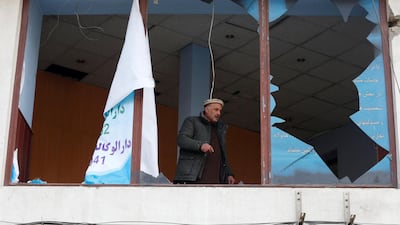Saturday’s bomb attack in a crowded area of Kabul is the second deadly event in the span of a week. There has also been an attack in Jalalabad within the same period. The Taliban seems determined to disrupt the peace and lay siege to Kabul.
The key questions now are why they have attacked and what prompted the urgency for this intensity of war? To understand this, it is essential to trace recent Afghan history.
Jalaluddin Haqqani, the patriarch of the Haqqani network, accepted Mullah Mohammed Omar after the fall of Kabul in 1996 as his titular overlord, but guarded the independence of his group.
Since he assumed the leadership in 2014, Sirajuddin, Jalaluddin’s son, has done so even more fiercely. The reason for this independence was that their acceptance of Omar’s superiority was very reluctant; caused by the impression, in 1996, that Pakistan and also the US, were determined to see Taliban become the rulers of Afghanistan.
Haqqani had been an asset nurtured by the CIA from 1990 until 1994 and had refused to interact with Pakistan's Inter-Services Intelligence. By 1996, Jalaluddin felt himself to have been abandoned by CIA and perhaps, therefore, felt compelled to accept Omar as overlord.
The Haqqanis belong to the Afghan Zadran, a Pashtun tribe. The bulk of this tribe resides in northern Afghanistan, the region surrounding Kabul. This is different to the Afghan Taliban, the bulk of whom are Durranis and Ghilzais, with a smattering of representation from other tribes, who are located around Kandahar in southern Afghanistan.
By virtue of geography, the Haqqanis have greater and easier access to Kabul and Jalalabad region than the Afghan Taliban. It is far easier to infiltrate and attack Kabul from its vicinity than to pass by scores of check-points manned by Afghan troops and linked by patrols of Afghans and Americans that pepper the routes from Kandahar.
Given the frequency with which these attacks have occurred, one might conclude that the perpetrators hail from areas in the vicinity of Kabul and Jalalabad, the area of the Afghan Zadran tribe, implying the Haqqani network was responsible.
But each of these attacks has been promptly claimed by the Afghan Taliban, rather than the Haqqani network. However, even if the attackers were not from the Haqqanis, they must have been given succor and assistance by the group. It also seems fair to assume that the Haqqani acceptance of the Taliban, now led by Hibatullah Akhundzada of Kandahar, is genuine.
The ingenuity and intrepid audacity of these recent attacks points towards the Haqqani network, but the group prides itself on only targeting US or Afghan security forces. Their effort was to avoid collateral damage as far as possible among the general public.
I can think of only two reasons that have prompted this significant change of heart. First, a shift in the acceptance of the Haqqanis now being part of the broader Taliban operation and no longer their own network, and second, an indifferent attitude towards civilian casualties.
The US has for some years singled out the Taliban for talks and refused to engage with the Haqqani network, identifying the latter as the implacable enemy. Donald Trump, however, has recently announced that there can be no negotiations with any dissident group. Thus placing the two on a level playing field again.
Haqqanis were beginning to feel isolated when they were considered the sole enemy by the US. Thus, when the two again reached parity, the Haqqani network was amenable to getting together with the Taliban. For their part, the Taliban are very conscious that while they might hold sway over a considerable portion of southern Afghanistan, their ability to threaten Kabul and its surrounding areas depends entirely on the cooperation of the Haqqani network.
Given the preceding events, their union seems to have been inevitable. The two have found common cause in their renewed determination to oust the US and remove the Kabul government; which is again being viewed as a US-puppet. And, if in that process, some innocent Afghans must die, so be it. This has been so in freedom struggles throughout history.
Despite the increasing diversity in US and Pakistan national interests in Afghanistan, most analysts, including myself, have held the view that the two still have hopes of reconciliation, since their common ultimate aim in the region is a peaceful and secure Afghanistan.
Of late, I have increasingly wondered if that is still true. Or, in its determination to contain China that the US has realised the invaluable location of Afghanistan is ideal for spreading insecurity into Muslim-heavy Western China as well as Central Asia and Pakistan, in a last attempt to sabotage the China-Pakistan economic corridor? Only time will tell if that is the case.
Brig Shaukat Qadir is a retired Pakistani infantry officer

